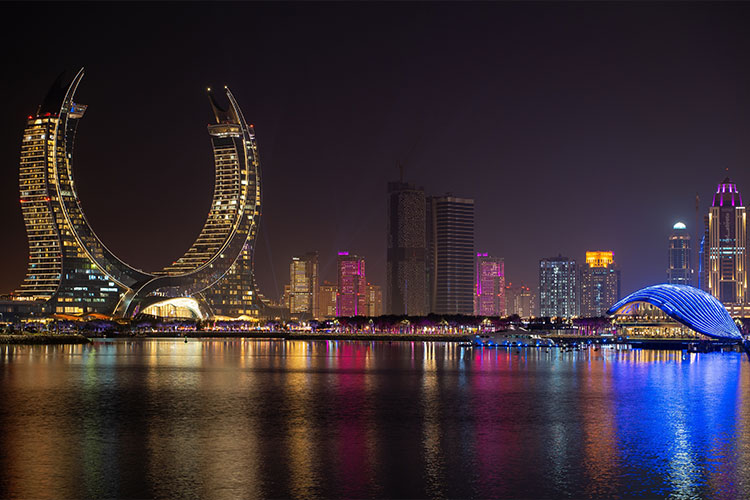

Home values rise on an average of 4.5% between 2018 and the end of H1 2024, according to global real estate agency Knight Frank
September 27, 2024 | Staff Reporter | Qatar | Property Management

GCC nationals and GCC-based expats are prepared to spend US$ 538 million on Qatar’s residential market according to global real estate consultancy Knight Frank’s second annual Destination Qatar report. Knight Frank, in partnership with YouGov, surveyed 502 GCC nationals and GCC-based expats (253 GCC nationals and 249 GCC-based expats), each with a minimum monthly income of US$ 5,000 to investigate regional attitudes, appetites and aspirations to own residential property in Qatar and to visit the country for leisure, shopping, and entertainment.
Residential Market
Knight Frank says the housing market in Qatar has remained subdued over the past year, influenced by multiple factors. Residential property demand has been generally stable against a backdrop of rising supply. This supply-demand imbalance, combined with mortgage affordability issues, continues to exert downward pressure on property prices and rental rates. Despite this, the residential sector has emerged as the most popular target asset class for GCC nationals and GCC-based expats. 65% of those surveyed by Knight Frank are keen on acquiring a residential property in Qatar within the next five years. 28% would like to transact during 2024.
Adam Stewart, Partner – Head of Qatar, explained: “The principal reason GCC nationals and GCC-based expats would like to own residential property in Qatar is purely for capital gains, while the second biggest motivation is for a buy-to-let property. Interestingly, this is also the biggest driver for expats living in Saudi as well as those in the UAE. Overall, we have uncovered a potential pool of US$ 537.5 million of private capital that is actively considering a residential purchase in Qatar. In comparison, the total value of all residential sales in Qatar during H1 2024 stood at US$ 907 million, highlighting the rapidity at which Qatar is starting to court the interest of regional purchasers and investors”.
With real estate budgets ranging from US$ 1.1 million for GCC-based expats to US$ 806,000 for GCC nationals, the branded residential sector's expansion appears almost inevitable if Qatar is to capture some of this apparent pent-up demand for branded homes in the country.
Shehzad Jamal, Partner - Strategy & Consultancy - Real Estate, Healthcare & Education, MENA, Knight Frank
Aside from residential real estate, branded residences were named the joint most popular real estate asset class for potential investors from around the region by GCC nationals and GCC-based expats. Shehzad Jamal, Partner – Strategy & Consultancy – Real Estate, Healthcare & Education, MENA, added, “Branded residences offer access to a lifestyle that appeals to non-resident investors. Aside from the guarantee of access to world-class facilities and amenities, when connected to a hotel, branded residences also offer a virtual guarantee of outstanding property and facilities management – a significant consideration for those not living in the same location. With real estate budgets ranging from US$ 1.1 million for GCC-based expats to US$ 806,000 for GCC nationals, the branded residential sector's expansion appears almost inevitable if Qatar is to capture some of this apparent pent-up demand for branded homes in the country.”
Retail Market
Elsewhere, Knight Frank says moves by the government to capitalise on the US$ 330bn infrastructure spend in the 10 years leading to the 2022 FIFA World Cup are paying dividends, with a 58% surge in visitor numbers during 2023 to 4 million. 1.6 million visitors have come to the country in Q1 of this year. Faisal Durrani, Partner – Head of Research, MENA, said: “Qatari authorities have channelled their efforts into transforming Qatar into a modern state, complete with a plethora of and growing number of tourist attractions, including the recently announced US$ 5.5 billion Simaisma Project.”
“Aside from the incredible tourist attractions that are emerging around the country, the luxury retail sector is fast emerging as a key magnet to prospective visitors. We have found that not only is the sector the second most popular investment asset class for GCC nationals and GCC-based expats, but 79% of regional visitors are keen to visit the country purely to go shopping. This suggests that the 880,000 square metres of new retail built in Qatar since 2011 has not gone unnoticed and is further contributing to Qatar’s attractiveness as one of the world’s most exciting new tourist destinations.”
Hospitality Market
Away from the residential and retail markets, Qatar’s hospitality sector has enjoyed a post-World-Cup boom, according to Knight Frank, with visitor numbers rising and hotel occupancy levels increasing in tandem, topping out at 70% between January and May, up from 58% last summer.
While just over a fifth (21%) of GCC nationals and GCC-based expat visitors would choose to stay in a 5-star hotel during a visit to Qatar, the bulk would like to stay in hotels rated 4 stars or less. Furthermore, nearly a third (28%) are willing to spend between US$ 100-200 on accommodation in Qatar, rising to 38% of Emiratis and 63% of Kuwaitis, hinting strongly at a market for more affordable hotel options.